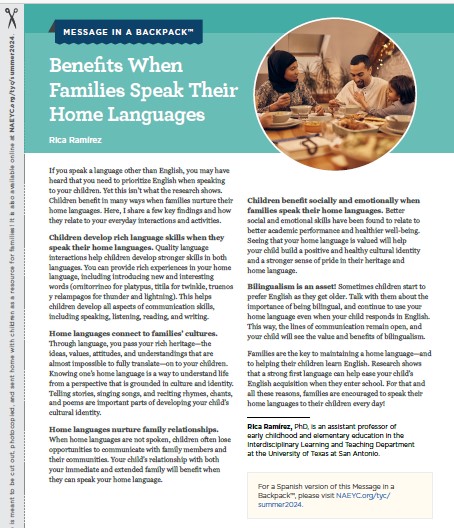Message in a Backpack™. Benefits When Families Speak Their Home Languages

You are here
If you speak a language other than English, you may have heard that you need to prioritize English when speaking to your children. Yet this isn’t what the research shows. Children benefit in many ways when families nurture their home languages. Here, I share a few key findings and how they relate to your everyday interactions and activities.
Children develop rich language skills when they speak their home languages. Quality language interactions help children develop stronger skills in both languages. You can provide rich experiences in your home language, including introducing new and interesting words (ornitorrinco for platypus, titila for twinkle, truenos y relampagos for thunder and lightning). This helps children develop all aspects of communication skills, including speaking, listening, reading, and writing.
Home languages connect to families’ cultures. Through language, you pass your rich heritage—the ideas, values, attitudes, and understandings that are almost impossible to fully translate—on to your children. Knowing one’s home language is a way to understand life from a perspective that is grounded in culture and identity. Telling stories, singing songs, and reciting rhymes, chants, and poems are important parts of developing your child’s cultural identity.
Home languages nurture family relationships. When home languages are not spoken, children often lose opportunities to communicate with family members and their communities. Your child’s relationship with both your immediate and extended family will benefit when they can speak your home language.
Children benefit socially and emotionally when families speak their home languages. Better social and emotional skills have been found to relate to better academic performance and healthier well-being. Seeing that your home language is valued will help your child build a positive and healthy cultural identity and a stronger sense of pride in their heritage and home language.
Bilingualism is an asset! Sometimes children start to prefer English as they get older. Talk with them about the importance of being bilingual, and continue to use your home language even when your child responds in English. This way, the lines of communication remain open, and your child will see the value and benefits of bilingualism.
Families are the key to maintaining a home language—and to helping their children learn English. Research shows that a strong first language can help ease your child’s English acquisition when they enter school. For that and all these reasons, families are encouraged to speak their home languages to their children every day!
Download the PDF for this Message in a Backpack™!
This PDF is available in both English and Spanish.

Photograph: © Getty Images
Copyright © 2024 by the National Association for the Education of Young Children. See permissions and reprints online at NAEYC.org/resources/permissions.
PhD, es profesora adjunta de educación elemental y de la primera infancia en el Departamento Interdisciplinario de Aprendizaje y Enseñanza de la Universidad de Texas en San Antonio.
